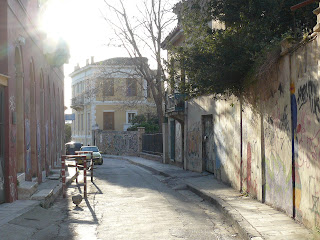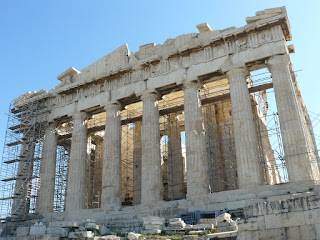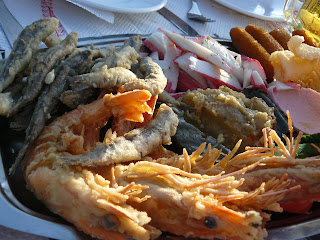
This is Ampelmann.
I have been meaning to write about the Ampelmann since returning from Berlin but thought the excitement to blog about it would fade away after awhile. It's been a month since I returned from Berlin and the image is still in my head. Like a virus in PC, it has refused to go. So I guess I must write about it to give it a final resting place.
The Ampelmann is the green man on the pedestrian light and represents a passing resemblance of the positive aspect of a failed East Germany social order.
When the Berlin Wall fell, East and West Germany were reunited. The status of the Ampelmann was suddenly thrown into uncertainty. The future of the Ampelmann was threatened.
There were calls for it to be taken out entirely not only because the Ampelmann represents the side of Germany many are not proud of but also because it didn't meet the road regulation standards of the new country.
However, the Ampelmann has acquired a cult status. There were cartoons of the Ampelmann. Teachers used the Ampelmann for children's road safety education. Publishers came out with Ampelmann bedtime stories. Kids loved the Ampelmann. This inadvertently made parents and adults love the Ampelmann too. East Germans were absolutely thrilled with the reunification but they didn't want to see the Ampelmann go.
This led the East Germans to launch a protest called the Ostalgie to bring the Ampelmann (and other East Germany icons) back. The protest was successful and the Ampelmann was saved.
Like all good bedtime stories, the Ampelmann lived happily ever after with his partner - the red man.
Monday, June 07, 2010
The Ampelmann
Sunday, May 23, 2010
RPK
RPK has for the first time yesterday appeared in London after being in exile for more than a year. He has publicly spoken about the evils of the ISA and challenged the Malaysian government to bring charges against him in the UK courts.
RPK said: “I will take on the government and I will fight them but I will do what Sun Tzu said, ‘Fight him in your territory.’
“So my territory is here in the UK,”
This is a snippet of the video taken during the talk yesterday.
Saturday, May 08, 2010
Berlin
I was in Berlin during the first May bank holiday.
This year Berlin is celebrating its 20th anniversary of the union of the east and west of the city and the fall of the wall that once separated them. So this is a good time to be in Berlin. Yes, this city is relatively a teenager in the scale of history.
One of the landmarks that suffered heavy damage was the parliament building known as the Reichstag. The reconstruction of the building and Norman Foster's distinctive glass cupola have made the building now a top attraction in Berlin. The queue to the Reichstag took me 1.5hours. Fortunately the shows by street performers broke the monotony of waiting in queue. I'd have happily spent half an hour watching the performance without the incentive of being in line to the Reichstag. So it wasn't that much of a torture really.
At the vantage point from the cupola, I enjoyed the view of the city skyline. This city reminded me of Osaka (even though the official Japanese sister city is Tokyo). Clean, systematic and safe. The transportation systems are brilliant! I had no problems traveling in Berlin even though I didn't speak German. The people were as nice as the Japanese too - friendly and polite.
If there are any more similarities to draw between them, it would be their technologies and ideology to perfection. They have everything worth mentioning from generous public space, safe cycle lanes to clever designs for the disabled. Am not sure if I'm allowed to speak so well about the Germans in the UK, but really, if I get an opportunity to work here, I would certainly take it!
I've also enjoyed the many historical and artistic parts of Berlin especially those as a result of the Nazi occupation and the Cold War. Life in those two periods was to me like a living hell. People were not allowed to express their opinions. Freedom of speech was a taboo subject. The freedom they grew up with was a different type of freedom. It was the freedom to listen. Just as I would like to draw parallels with Malaysia today, I guess Berlin at the time was much worse. People could be shot on the spot for saying the wrong thing!
It must have been so difficult for the people then. It seemed to me like it's a curse to be born an east German or a Jew in those periods. Life couldn't be any harder for them. Now these are the baby boomers. Today they leave a legacy of establishing a robust system of democracy from the political rubble of their predecessors.
Germans now have a lot more freedom than they ever had 40 years ago. The East Side Gallery in Berlin is a clear testament of that freedom- the once suppressed freedom of expression.

But how far is the freedom of expression now in Germany? Far, very far, in my opinion. If you are one of the people who tend to associate nudity and European cities after numerous encounters of nude sculptures, then Germany is a proper example of that. Germany is not only a country that boasts nude sculptures freely but also much on public nudity. In fact, a naturist movement called "freikorperkultur" or FKK is a German by-product of the freedom of expression. The FKK protects people's right to be nude or a free body in public. It has successfully removed extensive restrictions to public nudity in Germany for 30 years now.
But you need a good weather to be naked. No, I wasn't attempting that but in the time when I was in Berlin, the weather was still cold to dress in t-shirt only, let alone in skin. So, the real opportunity for that to happen is limited to the summer months. Now this explains why many German tourists flock to southeast Asian countries during winter to bare all! At the time of the year like now and towards the end of summer when the weather starts to cool, Berlin should be a good place for running and sports. I could imagine the Berlin Marathon in September will be absolutely brilliant!
Just as many German tourists flock to other countries for holidays, there are also many foreign nationals who flock to Berlin for holiday or work. The walking tour guide was an Aussie, the Hard Rock shop assistant who served me was a Malaysian and the hotel concierge was a British. In the Hard Rock store the two people behind the queue were Singaporeans, in the cafe the family sitting across the table were Filipino and the majority of the tourists were either Americans or British. This makes Berlin quite an international city, which explains why I didn't have problems with language at all.
 Amy, a Malaysian who works in Berlin Hard Rock Store
Amy, a Malaysian who works in Berlin Hard Rock Store(notice the Conference Bike in the background!)
 Sachsenhausen concentration camp and the cynical slogan "Works make you free"
Sachsenhausen concentration camp and the cynical slogan "Works make you free" Panorama of the semi-circular concentration camp
Panorama of the semi-circular concentration camp

Saturday, April 17, 2010
Athens
I've heard and read about the Greek civilization since secondary school. Athens, capital of Greece, was a powerful centre for arts, philosophy and a home to great philosophers like Plato, Aristotle and Socrates. The philosophers existed more than 300 years before Christ was born! In other words, wisdom has existed way before the Bible was conceived.
I was overwhelmed by a sense of achievement when I made it to the Parthenon. A sense of being able to see the edifice right in front of me; a photo in the history textbook came to life. It reminded me of history lesson 16 years ago. I could still remember asking the history teacher about the architecture of the temple and telling her that the building looked like an administrative building than a temple.
16 years on, I have developed more "matured" questions about this temple and the rest of the ruins. When I saw the ruins in Athens, I had been asking myself the question, "Why didn't the Greeks clear the ruins when the buildings were fallen? They had more than 1500 years to do so!"
Perhaps, coming from a civil engineering background, I tend to see ruins as something not pretty. I mean, the World Trade Centre in New York was not left on its own to become a tourist attraction in the next two millennium! Unlike the Acropolis, the WTC site's been cleared and is now being built over by the Freedom Tower.
To be fair, there were other great monuments which are still in good shape and use. For example, the first stadium of the modern Olympics is still in use today. The stadium was all made up of marbles. Standing in front of the stadium gave me a sense of awe and inspiration of the same project I am working in. It was also the finishing point of the marathon during the Athens Olympics in 2004.
And talking about marbles, most ancient parts of Athens are paved in marbles. Yes, such excess is obscene in the modern context. But that was what Athens was built on thousands of years ago. As part of their conservation programme of the ancient city, they have also spent huge amounts of money to use marbles as their road kerbs to keep up and match the material of the pavement. And you thought why the Greek economy isn't doing too well?
Many places were closed early on Easter because it is a big thing for the Greeks. Even though we didn't manage to visit the famous museums, we didn't miss the ruins. Furthermore, we had Noris' friend, Kostas, who drove us around Athens. So instead we covered a wider radius of Athens than we would have.
Kostas is a local. He was the real deal. With him bringing us around, we had the advantage of seeing and knowing more of Athens. For example, he brought us around in and out of Athens in his car. Having a car helped a lot, as he introduced us to the places we wouldn't have seen or known.
We also visited his summer home nearby a beach resort for drinks and dinner. Then he brought us to meet his family who prepared us another sumptuous dinner - yes, second round! Their generosity reminded me of the Japanese hospitality. Generous and friendly.
To say the food we had at Kostas place was Greek, is an understatement and does no justice to him. I would say it was high quality home-cooked traditional Greek food because of the difference I noticed when we ate out.
So what's Greek you asked? Greek salad, Greek coffee, Souvlaki, Moussaka, Ouzo, olive oil, olives, seafood and beautiful islands, to name a few. The beautiful island in the movie Mamma Mia, was Greek too. An observation of Greek food is that their presentation was always impressive which made me think Greeks enjoy their food a lot.
I am fascinated by Greek letters. We use them in science and they look familiar, yet I can't understand a word made out of these letters. For example, Greece is written as Ἑλλάς. I wouldn't have known! Even if you've done science, you wouldn't have guessed it. Their words looked like equations.
I've enjoyed my three days at this ancient city. Three days should be enough, as long as the museums are opened when you're there. But since we didn't cover the museums, perhaps it is worth making another trip here en route to Santorini or Mykonos in future.
Tuesday, April 06, 2010
Mother nature as teacher
Looking up the clear sky today brought me inspiration. So I wrote down my thoughts:
The four seasons are a teacher. They taught me to say goodbyes and accept that misery precedes happiness precedes misery and the cycle goes on. In misery I once lived, but in Spring I believe that things can only get better.











































